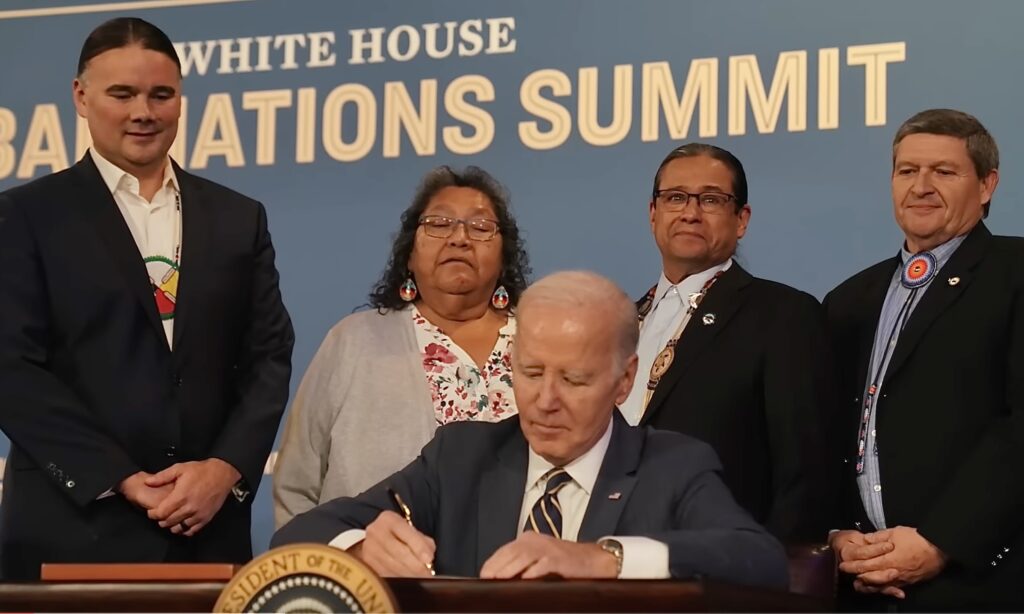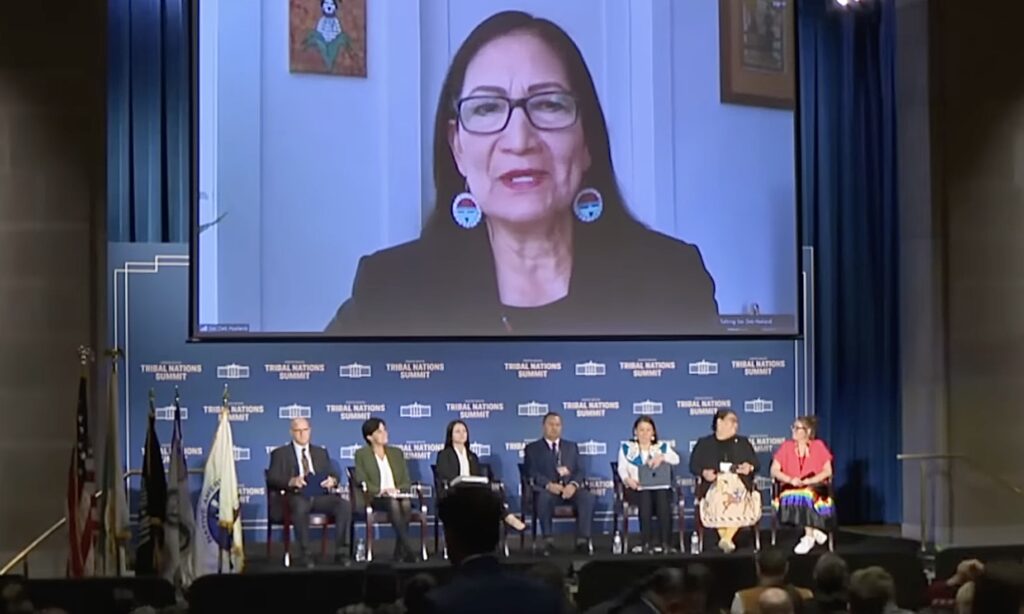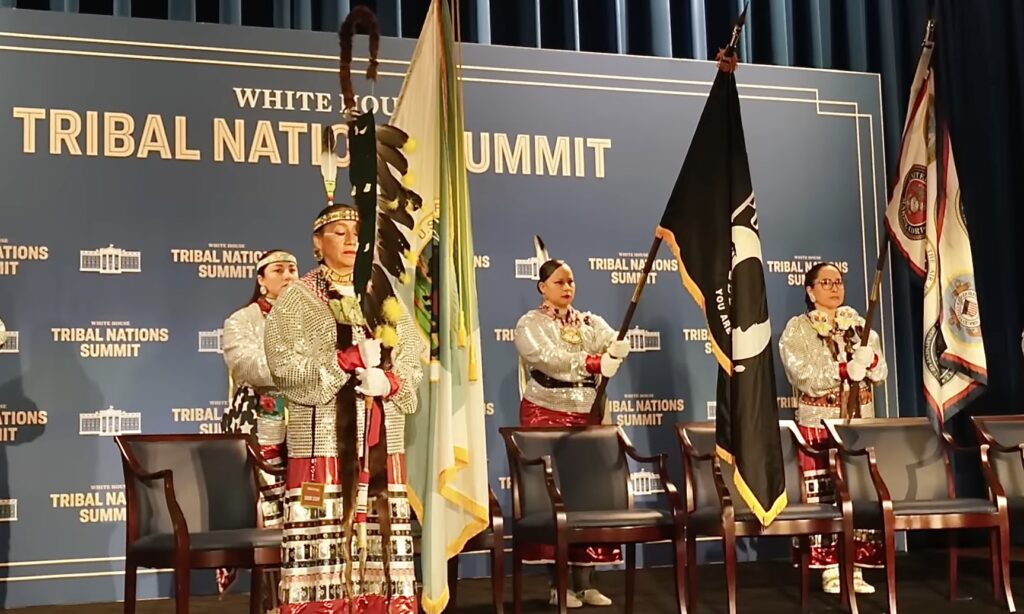At the recently concluded Tribal Nations Summit, President Biden signed an executive order directing agencies to streamline grant applications, co-manage federal programs, and “eliminate heavy-handed reporting requirements.” New opportunities for TCU students and faculty were also highlighted.
By Melanie Lenart

Tribal colleges and universities and their students will have easier access to federal funds and scholarships in the near future, thanks to a federal executive order signed during this year’s White House Tribal Nations Summit. The order streamlines federal grant applications and reporting requirements for tribal nations and those associated with them.
President Biden signed the executive order in the presence of about 100 tribal leaders who traveled to Washington, D.C., to participate in the Dec. 6-7 summit and related activities with the departments of Interior, Labor, Homeland Security, Commerce and Agriculture. The Biden administration established the annual summit in 2021. A similar initiative under the Obama administration was abandoned during the Trump administration.
“Today, there are still too many hoops to jump through, too many strings attached, and too many inefficiencies in the process,” President Biden said. “And here’s what that order does. It requires federal agencies to streamline grant applications, to co-manage federal programs, to eliminate heavy-handed reporting requirements. It gives Tribes more autonomy to make your own decisions.”
The executive order included provisions to advertise hundreds of funding opportunities relevant to tribal nations on a “one-stop” federal website, the Access to Capital Clearinghouse.
Student scholarship applications for the U.S. Department of Agriculture will be shorter and include stipends for living expenses, as noted in the 81-page summit progress report released during the summit. According to the report, the USDA this year allocated more than $5 million and signed six multi-year agreements to support more than 200 Indigenous students.
In the section focused on tribal colleges and universities, the report highlighted other agency efforts: the Environmental Protection Agency will provide new grants opportunities for Indigenous students; the National Endowment for the Humanities will offer funding for release time to faculty funded for its projects; and the Department of Education awarded $2.75 million to create opportunities for Indigenous teachers to serve in leadership roles and support culturally appropriate instruction at Native American schools.
Secretary of the Interior Deb Haaland participated in the summit remotely rather than in-person due to a case of Covid. Haaland, the first Native American to serve in a Cabinet role, is one of more than 80 Native Americans in senior roles in the Biden administration. “I often think of the world we are leaving to our children—the young people who are already taking action to defend our planet,” Haaland noted. “That’s why I launched the Indian Youth Service Corps, and why we’re supercharging this effort with $15 million from the Inflation Reduction Act.”

Post-secondary participants in the Indian Youth Service Corps work with the American Climate Corps to learn skills related to clean energy and other trainings for jobs in a “climate-resilience economy,” the progress report states. Funding for the youth corps is part of an ongoing investment in tribal nations.
“Across President Biden’s Investing in America agenda, a historic $45 billion—more than 15-years’ worth of the Bureau of Indian Affairs’ annual budget—has gone into Indian Country,” she said.
Haaland asked participants and listeners to fill out a future form, with a draft to be shared with tribal nations in January, to help assess total community needs. As the executive order explains, the Request for Information tool will help the White House Council on Native American Affairs, the Office of Management and Budget, and the White House Domestic Policy Council measure federal funding shortfalls for tribes and develop recommendations for necessary funding and programs.
Haaland also highlighted a tenfold increase in agreements to co-manage public lands. The number of co-stewardship agreements between federal agencies and tribal nations went from the 20 announced last year to more than 200 by the end of 2023, she indicated, adding, “Tribes from coast to coast play a greater role in the management of the lands and waters they have cared for since time immemorial.”
In her talk, Vice President Kamala Harris highlighted a $1.8 billion investment to connect “every person in Indian Country with high-speed internet.” She urged individuals to take advantage of the Affordable Connectivity Program, which reimburses households up to $75 a month to cover internet costs.
While she and other members of the administration lauded progress made in recent years, they also acknowledged past injustices—including the terrible chapter in US history involving the forced removal of Indigenous children from their homes for placement in federal boarding schools.
“Under the leadership of Secretary Haaland, we have created the first official list of boarding schools that received federal support,” Harris said. “We have identified dozens of marked and unmarked graves associated with those schools; and launched an oral history project to collect the stories of the survivors, many of whom are now the elders, to create a permanent record of these abuses so they can never be denied.”
Haaland reminded participants that the administration’s Federal Indian Boarding School Initiative plans to publish the second volume of its investigative report. The first volume, published in 2022, examined the role of the federal government in carrying out these harmful policies. The upcoming volume, “The Road to Healing,” focuses on input from survivors, descents and their families.

Flags flutter during the opening ceremony of the Tribal Nations Summit.
The Mellon Foundation and the National Endowment for the Humanities is also providing funding for an oral history project to document the experiences of Indigenous children in the federal boarding school system, which investigations have found to be rife with abuse.
“There are parts of our history that are painful, but they do not define us,” she said. “We define ourselves by the world we collectively build for current and future generations. It is up to all of us to tell our stories. And not just the stories of the bad times—but of those that we celebrate. Those that show our resilience, our strength, and our contributions.”
President Biden acknowledged historic injustice during his address as well. “Let me close with this. It’s hard work to heal the wrongs of the past and change the course and move forward. But the actions we’re taking today are key steps into that new era of Tribal sovereignty and self-determination—a new era, grounded in dignity and respect, that recognizes your fundamental right to govern and grow on your own terms.”
A five-minute overview of the summit, posted by the Department of Interior, can be viewed here.
Melanie Lenart is Native Science Report’s contributing editor.
Story published December 18, 2023.
• • •
Enjoyed this story? Enter your email to receive notifications.
